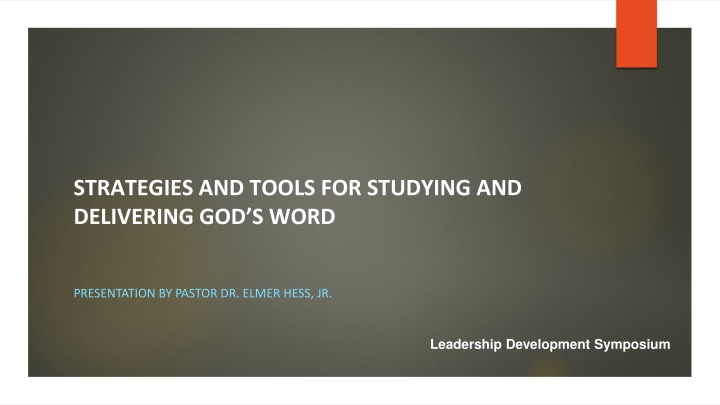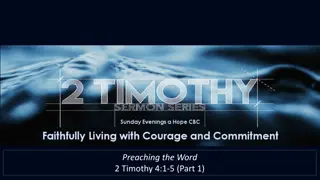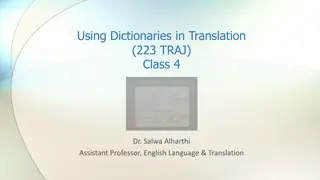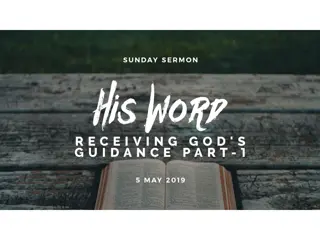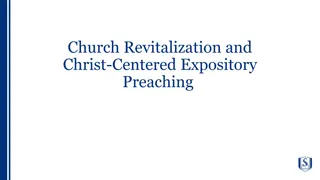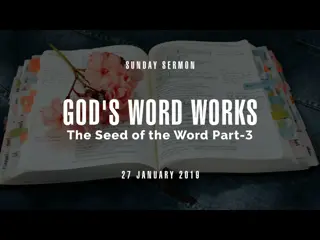Strategies and Tools for Studying and Delivering God's Word Presentation
Explore the leadership development symposium led by Pastor Dr. Elmer Hess Jr., focusing on strategies and tools for studying and delivering God's Word. Participants aim to grow in their desire to know, live, and share the Word of God, emphasizing spiritual knowledge, growth, and influencing others. The event highlights the importance of knowing, loving, and living out the teachings of God.
Download Presentation

Please find below an Image/Link to download the presentation.
The content on the website is provided AS IS for your information and personal use only. It may not be sold, licensed, or shared on other websites without obtaining consent from the author.If you encounter any issues during the download, it is possible that the publisher has removed the file from their server.
You are allowed to download the files provided on this website for personal or commercial use, subject to the condition that they are used lawfully. All files are the property of their respective owners.
The content on the website is provided AS IS for your information and personal use only. It may not be sold, licensed, or shared on other websites without obtaining consent from the author.
E N D
Presentation Transcript
STRATEGIES AND TOOLS FOR STUDYING AND DELIVERING GOD S WORD PRESENTATION BY PASTOR DR. ELMER HESS, JR. Leadership Development Symposium
EACH PARTICIPANT WILL GROW IN THEIR DESIRE TO KNOW, TO LIVE AND TO SHARE GOD S WORD. LESSON AIM
FIRST PENTECOSTAL FAMILY WORSHIP CENTER Our overall goal at First Pentecostal is to allow God s word to change (transform) your life. (Spiritual Knowledge! - KNOW) Our vision is to help others succeed in their daily spiritual walk. (Spiritual Growth! - GROW) Our strategy is to encourage and equip believers to pursue intimacy with Jesus Christ and to influence others. (Spiritual Walk/Talk! - SHOW)
FIRST PENTECOSTAL FAMILY WORSHIP CENTER KNOW GROW SHOW Know God s Word LEARN IT! Grow in God s Word LOVE IT! Show God s Word LIVE IT!
ICEBREAKER QUESTION What makes a great message?
ICEBREAKER QUESTION What are some of your challenges when studying and preparing to teach/preach the Word of God?
What is Preaching and Teaching God s Word?
OUR PURPOSE IN DELIVERING THE WORD OF GOD To Engage, Equip, and Empower God s People
I CAN LEAD A PERSON TO THE WATER, BUT I CAN T MAKE THEM DRINK, BUT I CAN MAKE THEM THIRSTY. QUOTE 2
EZRA 7:10 For Ezra had set his heart (resolved) to study and interpret the Law of the LORD, and to practice it and teach His statutes and ordinances in Israel.
NEHEMIAH 8:5-8 KJV 5 And Ezra opened the book in the sight of all the people; (for he was above all the people;) and when he opened it, all the people stood up: 6 And Ezra blessed the LORD, the great God. And all the people answered, Amen, Amen, with lifting up their hands: and they bowed their heads, and worshipped the LORD with [their] faces to the ground. 7 Also Jeshua, and Bani, and Sherebiah, Jamin, Akkub, Shabbethai, Hodijah, Maaseiah, Kelita, Azariah, Jozabad, Hanan, Pelaiah, and the Levites, caused the people to understand the law: and the people [stood] in their place. 8 So they read in the book in the law of God distinctly, and gave the sense, and caused [them] to understand the reading.
1 THESSALONIANS 2:13 NLT Therefore, we never stop thanking God that when you received his message from us, you didn t think of our words as mere human ideas. You accepted what we said as the very word of God--which, of course, it is. And this word continues to work in you who believe.
We are getting a lot of information, but we are not experiencing transformation. People have a high appetite for more word, but not for transformation. If information or knowledge does not bring about transformation, it is useless. Knowledge of itself is great to have, but of itself is useless unless it is used. PASTOR E.R. HESS, SR. QUOTE 2
FROM INFORMATION TO TRANSFORMATION Most sermons educate vs. creating a desire in people to want what God offers. We must move from Information - Transformation.
OUR EMPHASIS Our Emphasis must be Jesus Christ! John 5:39-40 (NLT) 39 You search the Scriptures because you think they give you eternal life. But the Scriptures point to me! 40 Yet you refuse to come to me to receive this life.
NUGGET Teaching is for Knowledge and Understanding Preaching is for Convincing
Good Preaching will inspire you to change, but the Holy Ghost will empower you to change. PASTOR WILLIAM MCDOWELL. QUOTE 2
STUDYING GODS WORD LOOK FOR THE Problem, Process, Prize
QUESTIONS TO ASK WHEN STUDYING GOD S WORD WHAT IT SAYS Observation - What s going on? What words are being used, background, What s happening around the text, time period, who is involved? Key characters, (PROBLEM) (Understand the Content) 1. Continued
QUESTIONS TO ASK WHEN STUDYING GOD S WORD WHAT IT MEANS Key Points, Interpretation... looking at it from your eyes, but greater God s eyes (PROCESS) - (Understand the Context) 2. Continued
QUESTIONS TO ASK WHEN STUDYING GOD S WORD WHAT IT MEANS FOR YOU Takeaway, Application, what s the point. SO WHAT? (PRIZE) - (Understand the Concept) 3.
SEVEN WAYS TO READ 1. Read Repeatedly 2. Read Thoughtfully . Determination and delight discernment 3. Read it Patiently Chronicles 9 Genealogy Jabez most honorable Continued
SEVEN WAYS TO READ 4. Read it Selectively Ask Who, What, When, Why and How (Wherefore) 5. Read it Prayerfully MAIN INGREDIENT Continued
SEVEN WAYS TO READ 6. Read Purposefully 7. Read it Reflectively Why I believe the Bible is Literally true You can trust it! The Lord is my LIGHT! Continued
SEVEN WAYS TO READ 2 Timothy 3:17 ( Purpose of Scripture) That the man of God may be perfect, throughly furnished unto all good works. (KJV) Ephesians 2:10 - Good Workmanship.. unto Good works that we should walk in them. 2 Peter 1:20 Knowing this first, that no prophecy of the scripture is of any private interpretation.
https://www.moodychu rch.org/wp- content/uploads/2018/ 01/Precepts-Precept- Ministries-Inductive- Study-Overview.pdf INDUCTIVE BIBLE STUDY
INDUCTIVE BIBLE STUDY God s eternal, inerrant Word is your guidebook for all of life, and inductive study gives you the key to under- standing that guide. Inductive study, a method that brings you directly to the Word of God apart from another s understanding or interpretation of the text, involves three skills: observation, interpretation, and application.
OBSERVATION: Discover What It Says
INDUCTIVE BIBLE STUDY OBSERVATION: Discover What It Says 1. Begin with Prayer Prayer is often the missing element in Bible study. You are about to learn the most effective method of Bible study there is. Yet apart from the work of the Holy Spirit, that s all it will be a method. Continued
INDUCTIVE BIBLE STUDY OBSERVATION: Discover What It Says 2. Ask the 5 W s and an H As you study any passage of Scripture, train yourself to constantly ask: Who? What? When? Where? Why? How? These questions are the building blocks of precise observation, which is essential for accurate interpretation. Continued
INDUCTIVE BIBLE STUDY OBSERVATION: Discover What It Says 3. Mark key words and phrases (see figure on slide 4) A key word is one that is essential to the text. Key words and phrases are repeated in order to convey the author s point or purpose for writing. For example, notice that some form of the word suffering is used three times in 1 Peter 5. Key words can be marked using symbols, colors, or a combination of the two. Continued
INDUCTIVE BIBLE STUDY OBSERVATION: Discover What It Says 4. Make lists Making lists can be one of the most enlightening things you do as you study. Lists reveal truths and highlight important concepts. 1 Peter 5:2,3, for example, contains a simple list regarding the role of the elder, shown by numbering the items in the text. It is also helpful to make a list of what you learn about each key word or person you mark. Continued
INDUCTIVE BIBLE STUDY OBSERVATION: Discover What It Says 5. Watch for contrasts and comparisons Contrasts and comparisons use highly descriptive language to make it easier to remember what you ve learned. For example, Peter compares the devil to a roaring lion in verse 8. Peter also contrasts God s attitude toward the proud and the humble. Continued
INDUCTIVE BIBLE STUDY OBSERVATION: Discover What It Says 6. Note expressions of time The relationship of events in time often sheds light on the true meaning of the text. Marking them will help you see the sequence or timing of events and lead to accurate interpretation of Scripture. Continued
INDUCTIVE BIBLE STUDY OBSERVATION: Discover What It Says 7. Geographic Locations Often it s helpful to mark geographical locations, which tell you where an event takes place. Continued
INDUCTIVE BIBLE STUDY OBSERVATION: Discover What It Says 8. Mark terms of conclusion Words such as therefore, thus, and for this reason indicate that a conclusion or summary is being made. You may want to underline them in the text. Continued
INDUCTIVE BIBLE STUDY OBSERVATION: Discover What It Says 9. Identify chapter themes The theme of a chapter will center on the main person, event, teaching, or subject of that section of Scripture. Themes are often revealed by reviewing the key words and lists you developed. Try to express the theme as briefly as possible, using words found in the text.
INTERPRETATION: Discover What It Means WHILE OBSERVATION LEADS TO AN ACCURATE UNDERSTANDING OF WHAT THE WORD OF GOD SAYS, INTERPRETATION GOES A STEP FURTHER AND HELPS YOU UNDERSTAND WHAT IT MEANS. AS YOU SEEK TO INTERPRET THE BIBLE ACCURATELY, THE FOLLOWING GUIDELINES WILL BE HELPFUL:
INDUCTIVE BIBLE STUDY INTERPRETATION: Discover What It Means 1. If you lay the solid foundation of observation, you will be prepared to consider each verse in the light of the surrounding verses, the book in which it is found, and the entire Word of God. As you study, ask yourself: Is my interpretation of this passage of Scripture consistent with the theme, purpose, and structure of the book in which it is found? Is it consistent with other Scripture about the same subject? Am I considering the historic and cultural context? Never take a Scripture out of its context to make it say what you want it to say. Discover what the author is saying; don t add to his meaning. Remember that context rules. Continued
INDUCTIVE BIBLE STUDY INTERPRETATION: Discover What It Means 2. When you know God s Word thoroughly, you will not accept a teaching simply because someone has used one or two isolated verses to support it. You will be able to discern whether a teaching is biblical or not. Saturate yourself in the Word of God; it is your safeguard against wrong doctrine. Always seek the full counsel of the Word of God Continued
INDUCTIVE BIBLE STUDY INTERPRETATION: Discover What It Means 3. Remember that Scripture will never contradict Scripture. Remember, all Scripture is inspired by God. Therefore, Scripture will never contradict itself. Sometimes, however, you may find it difficult to reconcile two seemingly contradictory truths taught in Scripture, such as the sovereignty of God and the responsibility of man. Don t take a teaching to an extreme that God doesn t. Simply humble your heart in faith and believe what God says, even if you can t fully understand or reconcile it at the moment. Continued
INDUCTIVE BIBLE STUDY INTERPRETATION: Discover What It Means 4. Don t base your convictions on an obscure passage of Scripture. An obscure passage is one in which the meaning is unclear or not easily understood. Because these passages are difficult to understand even when proper principles of interpretation are used, they should not be used as a basis for establishing doctrine. Continued
INDUCTIVE BIBLE STUDY INTERPRETATION: Discover What It Means 5. God spoke to us that we might know truth. Therefore, take the Word of God at face value in its natural, normal sense. Look first for the clear teaching of Scripture, not a hidden meaning. Understand and recognize figures of speech and interpret them accordingly. Interpret Scripture Literally Consider what is being said in the light of its literary style. For example, you will find more similes and metaphors in poetical and prophetic literature than in historical or biographical books. Interpret portions of Scripture according to their literary style. Some literary styles in the Bible are: Historical Acts, Exodus; Prophetic Revelation, Isaiah; Biographical Luke; Didactic (teaching) Romans; Poetic Psalms; Epistle (letter) 2 Timothy; Proverbial Proverbs Continued
INDUCTIVE BIBLE STUDY INTERPRETATION: Discover What It Means 6. Look for the single meaning of the passage. Always try to understand what the author had in mind when you interpret a portion of the Bible. Don t twist verses to support a meaning that is not clearly taught. Unless the author of a particular book indicates that there is another meaning to what he says, let the passage speak for itself.
APPLICATION: Discover How It Works
INDUCTIVE BIBLE STUDY APPLICATION: Discover How It Works The first step in application is to find out what the Word of God says on any particular subject through accurate observation and correct interpretation of the text. Once you understand what the Word of God teaches, you are then obligated before God to accept that truth and to live by it. Scripture will always teach what is right, show us where we are wrong, how to correct, and train us in right living; so that we are complete, fully equipped for every good work. 2 Timothy 3:16-17.
THE INTO THY WORD MINISTRIES INDUCTIVE BIBLE https://files.stablerack. com/webfiles/70030/In ductiveBibleStudyChe atSheet.pdf STUDY CHEAT SHEET
